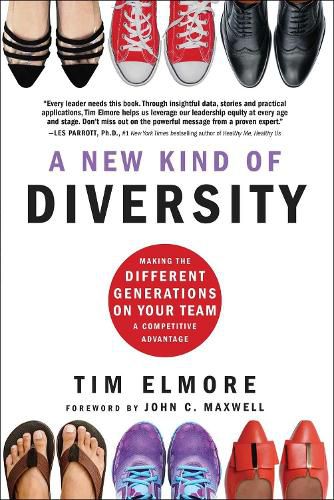Readings Newsletter
Become a Readings Member to make your shopping experience even easier.
Sign in or sign up for free!
You’re not far away from qualifying for FREE standard shipping within Australia
You’ve qualified for FREE standard shipping within Australia
The cart is loading…






In A New Kind of Diversity, bestselling author Tim Elmore brings his decades of research and leadership experience to bear on what might be the biggest, most dramatic, and most disruptive shift the American workforce has ever seen: the vast diversity of several generations living–and working–together. The past few years have brought an endless cascade of social media movements that left many of us … well … scratching our heads. #Occupy Wallstreet. #March For Our Lives. #Black Lives Matter. #MeToo. #ClimateChange. Regardless of how you might feel about these protests, each symbolizes a gap. Despite the perspectives on all sides of these causes, a clear issue remains:
There is a huge gap in this country that few are taking seriously.
While diversity is usually seen as an ethnic, gender, or income issue–there is a new kind of diversity that only eight percent of U.S. companies even recognize: diverse generations on teams.
Long laughed off as a cliche and more recently mocked in memes #HowToConfuseMillennials and #OKBoomer hashtags, the generational gap has become an undeniable tension in the global workplace. Sadly, it has fostered:
Loneliness in our workplaces. Poor communication on our teams. Reduction in revenue and team morale.
Conflicting values and priorities in the office. Divisions that lead to walls instead of bridges.
For the first time in history, up to five generations find themselves working alongside each other in a typical company. The result? There can be division. Interactions between people from different generations can resemble a cross-cultural relationship. Both usually possess different values and customs. At times, each generation is literally speaking a different language! How can we hope to work together when we can’t even understand each other?
This book provides the tools to:
Get the most out of the strengths of each age group on your team. Foster effective communication instead of isolation among people. Build bridges rather than walls so that loneliness becomes connectedness.
Connect people to learn how both veterans and rookies can mentor each other.
$9.00 standard shipping within Australia
FREE standard shipping within Australia for orders over $100.00
Express & International shipping calculated at checkout
Stock availability can be subject to change without notice. We recommend calling the shop or contacting our online team to check availability of low stock items. Please see our Shopping Online page for more details.
In A New Kind of Diversity, bestselling author Tim Elmore brings his decades of research and leadership experience to bear on what might be the biggest, most dramatic, and most disruptive shift the American workforce has ever seen: the vast diversity of several generations living–and working–together. The past few years have brought an endless cascade of social media movements that left many of us … well … scratching our heads. #Occupy Wallstreet. #March For Our Lives. #Black Lives Matter. #MeToo. #ClimateChange. Regardless of how you might feel about these protests, each symbolizes a gap. Despite the perspectives on all sides of these causes, a clear issue remains:
There is a huge gap in this country that few are taking seriously.
While diversity is usually seen as an ethnic, gender, or income issue–there is a new kind of diversity that only eight percent of U.S. companies even recognize: diverse generations on teams.
Long laughed off as a cliche and more recently mocked in memes #HowToConfuseMillennials and #OKBoomer hashtags, the generational gap has become an undeniable tension in the global workplace. Sadly, it has fostered:
Loneliness in our workplaces. Poor communication on our teams. Reduction in revenue and team morale.
Conflicting values and priorities in the office. Divisions that lead to walls instead of bridges.
For the first time in history, up to five generations find themselves working alongside each other in a typical company. The result? There can be division. Interactions between people from different generations can resemble a cross-cultural relationship. Both usually possess different values and customs. At times, each generation is literally speaking a different language! How can we hope to work together when we can’t even understand each other?
This book provides the tools to:
Get the most out of the strengths of each age group on your team. Foster effective communication instead of isolation among people. Build bridges rather than walls so that loneliness becomes connectedness.
Connect people to learn how both veterans and rookies can mentor each other.